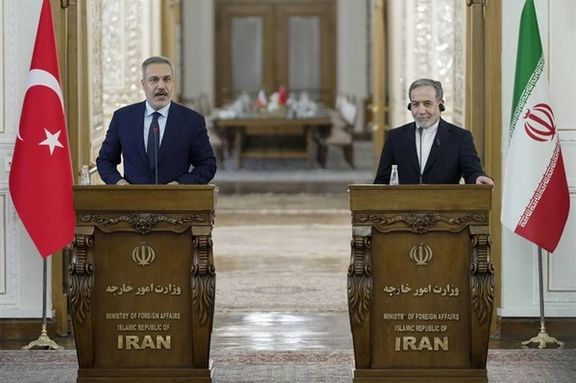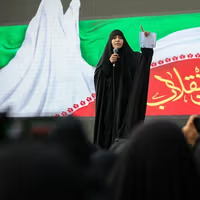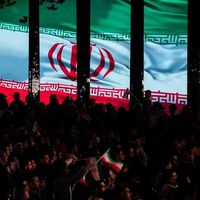According to the source, the Islamic Revolutionary Guard Corps' main Chinese partner is Haokun Energy Group, a Beijing-based company that owes Iran nearly $1 billion for oil transactions with IRGC-linked firms over the past several years.
An oil firm closely linked to Iran's conventional armed forces has been pursuing air defense kit from a Chinese customer, the source added.
"The oil headquarters in the Armed Forces General Staff and the IRGC are using their commercial connections in China to contact Chinese companies for procurement of Chinese strategic weapons systems, mainly missiles, UAVs and air defense systems," the source told Iran International.
The Iranian military organizations, the source added, want the Chinese companies act as intermediaries and facilitators for Chinese state-owned defense manufacturers, to settle debts or structure oil-for-arms deals.
Haokun Energy, which is operated by former Chinese military officials, was sanctioned by the US Treasury Department in May 2022 for allegedly purchasing millions of barrels of oil from IRGC foreign operations division, the Quds Force.
“A high-ranking IRGC delegation in September visited China to negotiate with Haokun executives over the settlement of the outstanding debt,” the source said.
Although official reports made no mention of the IRGC visit, a separate Iranian government delegation led by President Masoud Pezeshkian traveled to China around the same time. Pezeshkian announced that during the trip, “good agreements” were reached with Chinese officials.
The source confirmed that one of these agreements proposed involved Haokan settling part of its oil debt by transferring weapons directly to the IRGC.
It remains unclear whether the deal has been finalized, but if confirmed, it would mark the first reported instance of China providing military equipment to Iran as payment for oil.
Haokan Energy did not respond to an Iran International request for comment.
Iran’s defense systems need
Iran’s efforts to purchase weapons from China come as its air defense infrastructure was largely destroyed during a 12-day conflict with Israel in June, leaving the restoration of its replenishment a top priority for Tehran.
Field and military assessments indicate widespread destruction of Iran’s defense installations in that war, including the loss of more than 70 key air defense systems and radar units, significantly reducing the country’s operational capability.
The reimposition of UN sanctions last month triggered by European powers skeptical of Tehran's nuclear program has likely rendered Iran's ability to rebuild its arsenal more difficult.
Under the sanctions, the export or import of weapons to or from Iran — including small arms, heavy weapons, ammunition and missile systems — is prohibited. Iran is barred from acquiring or selling any military equipment, whether through official or unofficial means.
All activities related to ballistic missiles, including testing, production, research, development or supply of components and related technologies, are also banned by the new measures.
China opposed the reactivation of the snapback mechanism and has so far not announced any intention to comply with the sanctions, which are codified in a UN Security Council resolution and apply to all member states.
Beijing is secretly funneling billions of dollars to Iran through a covert payment system that bypasses international sanctions by swapping oil for infrastructure projects, The Wall Street Journal reported on Monday, saying the hidden conduit enabled Tehran to receive up to $8.4 billion last year.
Citing Western officials, the report said the mechanism -- linking state-owned firms, a government insurer, and an unregistered financial intermediary -- has provided a critical lifeline to Iran’s sanctions-hit economy, with state insurer Sinosure and a little-known financial vehicle called “Chuxin” channeling the money to Chinese contractors working in Iran.
A second channel for Chinese arms procurement
In addition to the IRGC’s direct contacts with Haokan, Majid Azami, CEO of Sepehr Energy, a company affiliated with the Armed Forces General Staff, has also played a key role in parallel negotiations for weapons purchases from China, the source said.
The US Treasury sanctioned Azami in November 2023 for his alleged role in facilitating international oil sales on behalf of Iran’s military.
The source said that during meetings with representatives of an energy and oil company based in Hong Kong, Azami proposed the purchase of advanced air defense systems for Iran.
Iran International is withholding the name of the firm pending its response to a request for comment.
Through these arrangements, oil brokers affiliated with Iran’s armed forces, like those tied to the IRGC, have leveraged their connections in China’s energy sector to pursue weapons deals.
It may not be the first time Chinese companies have provided materials or equipment for Iran’s military programs.
A Chinese company, Lion Commodities Holdings Limited, had signed a contract with an Iranian firm linked to the General Staff to supply thousands of tons of ammonium perchlorate, a chemical used in rocket fuel, Wall Streel Journal reported in June.
China’s proposal
"The Chinese side explicitly stated its willingness to sell weapons systems to Iran, similar to its existing arms trade with Pakistan," the source said.
Earlier, the Hudson Institute had reported Iran’s growing interest in acquiring a wide range of Chinese military hardware, including fighter jets, air defense systems, and missiles.
Less than a month after the 12-day war, Newsweek also published a report on Iran’s efforts to procure Chinese weapons.
On July 6, Middle East Eye, citing an Arab diplomatic source, reported that China had transferred advanced surface-to-air missile systems to Iran in the weeks following the ceasefire between Tehran and Tel Aviv, in exchange for oil shipments.
Military control over oil
A significant portion of Iran’s oil exports are handled by Sepehr Energy Jahan Nama Pars, a company affiliated with the General Staff of the Armed Forces, according to several US Treasury Department statements. Its multi-billion-dollar annual revenues are directed toward the IRGC, Quds Force, and the General Staff.
The Treasury said that in December 2024 alone, this company and its network exported nearly two million barrels of oil worth over $100 million to China.
A Reuters investigation found that by late 2024, the IRGC controlled nearly 50 percent of Iran’s oil exports primarily to China through a shadow fleet and front companies, up from about 20 percent in 2021.
Haokan’s failed investments in Iran
According to Iran International’s source, Haokan has in recent years attempted to settle part of its debt to the Iranian military through contracts with Khatam al-Anbiya Construction Headquarters and by transferring a passenger aircraft.
Haokan Energy on May had bartered two Airbus A330 aircraft, each worth under $30 million, for Iranian oil at a total value of $116 million, Iran's semi-official news agency ILNA reported.
It added that Haokan joined the project to expand Tehran’s Imam Khomeini Airport Phase II during Ebrahim Raisi’s presidency but abandoned it after the groundbreaking ceremony. Its other attempts to enter railway, wagon procurement and Tehran–Mashhad electrification projects also failed.
History of Iran-China military
During the 1980s and 1990s, Iran purchased anti-ship cruise missiles from China, which later served as the basis for domestically produced Noor, Nasr and Kosar missiles through reverse engineering.
According to the US Institute of Peace, the years 1991–1994 marked a peak in Iran’s arms imports from China. In 2010, Iran inaugurated the production line of the Chinese-origin Nasr-1 missile, but Beijing withdrew from the project following the imposition of UN sanctions.
Research reports indicate that since 2015, no record of direct Chinese arms sales to Iran has been documented. Military cooperation between the two countries appears to have been limited to dual-use components, chemicals and technologies rather than large-scale weapons transfers.














